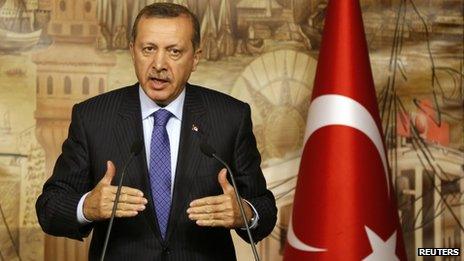Erdogan turnaround gets mixed reviews
- Published

One paper sees Mr Erdogan's change of heart as a chance for judicial reform
Turkish commentators have mixed views on Prime Minister Recep Tayyip Erdogan's apparent political turnaround in favour of retrials for hundreds of military officers convicted of plotting to overthrow the government.
While welcoming it as an opportunity to correct possible injustices, some are sceptical about the timing and motives behind the move.
Others see it as an overdue chance to institute reform in a judicial system which they see as discredited.
'Innocents'
Writing in the left-wing liberal daily Radikal, external, Cengiz Candar says that in the Ergenekon and Balyoz (Sledgehammer) trials, "apparently many innocents have suffered with those who were guilty. Certainly, it is beneficial to correct that. However, Tayyip Erdogan is not undertaking this because he is in the pursuit of justice."
Mr Erdogan's apparent "embracing" of the military which he once opposed is part of his strategy in the current power struggle with the Gulen movement, the writer suggests.
"From this point onwards, claims that the 'military tutelage regime' has been ended by the 'Tayyip Erdogan democracy' and that the 'old Turkey' has been replaced by the 'new Turkey', is a government lie," he writes.
In contrast, a commentary by Ibrahim Kiras in the pro-government Star, external daily voices strong support for the move.
"It was widely known that there were coup plots against the government in 2003-2004. Therefore, the Ergenekon case, which started as an effort to reveal those who were behind these plots, was legitimate. However, the judicial process later turned into something else that included many others who did not have a part in these plots," the writer says.
"Journalists, who wrote books on some issues, as well as police directors, were somehow linked to Ergenekon and were imprisoned. Members of the intelligence agency working on certain issues and some military personnel too had to face the same fate," he says.
'Opportunity'
A commentary in pro-government Yeni Safak, external sees Mr Erdogan's change of heart as a chance for judicial reform.
"Similar to the prime minister, I also think that this latest crisis is an opportunity," writes Markar Esayan.
"Through a reform process, which does not favour or isolate any group... we have to carry our judicial system to the universal legal standards and a libertarian mentality," he writes.
"Today, we are living in a country where a person or an institution, that is on the opposite side and is somehow chosen as a target, does not feel secure. This situation is not sustainable," the commentator says.
Mustafa Balbay, writing in secular daily Cumhuriyet, external, which is normally critical of the government, concurs.
"We have come to such a point that the judges and attorneys have lost their independence, the decisions that were made do not rely on conscience; the division of power between the legislature, judiciary and the executive power has collapsed," he writes.
Mr Balbay is an opposition MP who was himself sentenced to 34 years in the Ergenekon trial and spared prison for the moment only because of his parliamentary immunity.
"The solution of a free and independent judiciary... will not only provide the release of those in prison, but also the release of the law," he writes.
But Taha Akyol, writing in the secularist and centre-right Hurriyet, external, sounds a note of caution.
"In some court cases, the limits were crossed. Yes, let us correct that. But we should be very careful not to weaken the judiciary... Let us not be driven from one extreme to another."
'Icing on the cake'
A commentator in the pro-Gulen daily Zaman, external meanwhile takes issue with his fellow pundits in the Erdogan-supporting press, whom he accuses of adopting "war rhetoric" for echoing the government line in their attacks on the Gulen movement.
"Without shame, they can line up the adjectives such as 'gang, parallel structure, alternative state and pincers' one after the other while talking about the [Gulen] 'community'," writes Ekrem Dumanli.
"The love and respect they show for the Ergenekon and Balyoz [Sledgehammer] prisoners, whom they were criticising up until yesterday, are the icing on the cake," he concludes.
BBC Monitoring, external reports and analyses news from TV, radio, web and print media around the world. For more reports from BBC Monitoring, click here. You can follow BBC Monitoring on Twitter , externaland Facebook, external.
- Published6 January 2014
- Published3 January 2014
- Published2 January 2014